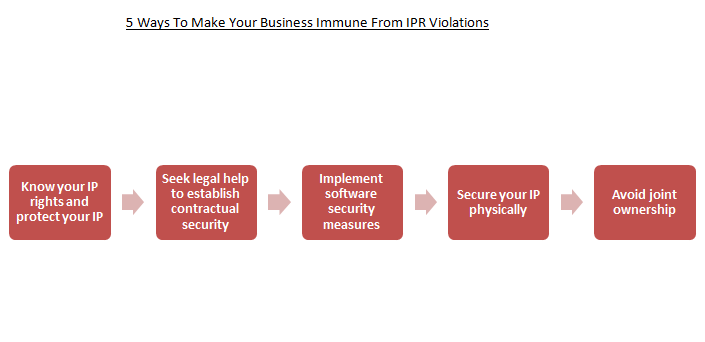5 Ways To Make Your Business Immune From IPR Violations
If intellectual property (IP) is the heart of an organisation, intellectual property rights (IPR) is its soul! Intellectual property is an umbrella term encompassing all intangible assets owned by a company, be it in the form of trademarks, trade secrets, or something else. A company’s IP is more valuable than its tangible assets on any given day. This is why IP protection is vital to the functioning of a company.
Today, companies own hundreds of patents each and that is only a part of their IP portfolios. With the burgeoning IP portfolios, the technology that has made sensitive data more accessible and distributable has grown at a rapid rate, thereby rendering IP more and more vulnerable. Hence, making a business immune from IPR violations is not just a key process but also a complex one that requires multiple departments including but not limited to IT, legal, Human Resources et al, to join forces.
Here is a list of the 5 principal ways in which you can ensure that your IPR does not get violated.

Table of Contents
1. Register Trademarks, Copyrights, Patents and know your IP rights
Patents, trademarks, and copyrights are the most common ways of protecting IP. A patent grants legal protection by prohibiting anyone other than the company filing the patent from manufacturing and/or distributing any of the latter’s inventions. A company is known by a certain set of symbols, logos, names, designs, and catchphrases promoted by the company itself for brand connection. These can be protected by registering a trademark for the same. Copyright ensures the legal protection of the tangible expression of a creative idea, such as a poem, a song, a novel, or a movie.
Essentially, IP rights are of various types. A patent remains valid for 15 to 20 years from the date of filing, after which it needs to be renewed. While a trademark is registered in perpetuity, you have to renew it once 10 years after its date of registration. A copyright lasts for the lifetime of the creator and for another 70 years after that. It is extremely important that you know the difference between the different types of IP and register for IP rights accordingly.
2. Get legal help in establishing contractual security
Businesses must have detailed non-disclosure agreements (NDA) in place to ensure IP protection. These NDAs make employees and partners legally liable for disclosure of sensitive data and thus make sure that employment agreements, sales contracts, technology transfer agreements, licenses, etc. safeguard the company’s IP. Legal contracts are especially important when it comes to licensing where you let a third-party company access your product for branding and distribution. Licensing covers a lot of ground. So, it is of great significance that you get adequate legal help to establish the terms of use in the licensing agreement.
3. Implement software security measures
Technology has fuelled the growth and success of businesses like nothing else. But the same technology can ruin a business, especially if its IP is stored online in a way that is vulnerable to security lapses or file corruption. So, it is the need of the hour to administer various security measures as part of the business’ IP framework. These include:
- Limiting IP access to only essential personnel and contractors
- Encrypting IP and any related data that is shared digitally
- Storing IP and related data on systems with adaptive authentication
- Disallowing unofficial copies of IP on network drives or USB devices
- Using Virtual Private Networks (VPN) and Wi-Fi Protected Access 2 (WPA2)
4. Secure your IP physically
IP and related data are not just stored and leaked only digitally and electronically. IP is stored on input/output devices such as scanners, copiers, printers, fax machines as well. These devices are all usually linked to a remote management system. So, there must be proper procedures to purge these devices of sensitive data and prevent any leak. Businesses must also make sure to keep places such as the paper archive room and server farm strictly locked. Access to these areas must be restricted to essential personnel only.
5. Avoid joint ownership
Joint ownership of IP is often a recipe for unforeseen complexities that businesses would do well without. A company’s intellectual property may be created through collaborative effort but it is always better if its control remains with one party. In joint ownership, every party owning the IP is legally entitled to recreate, distribute, or do whatever they wish to with the IP without having to discuss anything with the other parties. This makes IP protection difficult and complicated, thereby causing damage to all stakeholders.
IP is an asset that generates revenue for a business. So, it is a key business process to ensure the protection of IP. It is never too early to implement safety measures. Also, it is never too costly either. Yes, there is a substantial expense related to IP protection. However, that is nothing compared to the risk of getting your IPR violated. Always look at the bigger picture and get the best professional help to navigate the complex world of IPR.
-The Editorial Team




